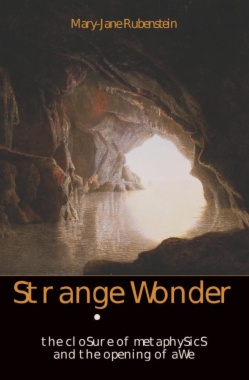Strange Wonder confronts Western philosophy's ambivalent relationship to the Platonic "wonder" that reveals the strangeness of the everyday. On the one hand, this wonder is said to be the origin of all philosophy. On the other hand, it is associated with a kind of ignorance that ought to be extinguished as swiftly as possible. By endeavoring to resolve wonder's indeterminacy into certainty and calculability, philosophy paradoxically secures itself at the expense of its own condition of possibility.
Strange Wonder locates a reopening of wonder's primordial uncertainty in the work of Martin Heidegger, for whom wonder is first experienced as the shock at the groundlessness of things and then as an astonishment that things nevertheless are. Mary-Jane Rubenstein traces this double movement through the thought of Emmanuel Levinas, Jean-Luc Nancy, and Jacques Derrida, ultimately thematizing wonder as the awesome, awful opening that exposes thinking to devastation as well as transformation. Rubenstein's study shows that wonder reveals the extraordinary in and through the ordinary, and is therefore crucial to the task of reimagining political, religious, and ethical terrain.
- Contents
- Acknowledgments
- Introduction: Wonder and the Births of Philosophy
- Socrates’ Small Difficulty
- The Wound of Wonder
- The Death and Resurrection of Thaumazein
- The Thales Dilemma
- 1. Repetition: Mertin Hetdegger
- Metaphysics’ Small Difficulty
- Wonder and the “First Beginning”
- Wonder and the “Other Beginning”
- Theaetetus Redux: The Ghost of the Pseudês Doxa
- Once Again to the Cave
- Rethinking Thaumazein
- 2. Openness: Emmanual Levinas
- Passivity and Responsibility
- The Ethics of the Cave
- Infinity and Astonishment
- Opening Out: From Existent to Existence
- Closing Down: From Existence to Existent
- Locking Up: Totality and Infinity
- The Phantom of the Autrement
- Awakening
- 3. Relation: Jean-Luc Nancy
- The Problem of Mitsein
- Mitsein as Essential Inessentiality
- The Myth of Essentialism
- Unworking
- Interruption
- Il n’y a qu’il y a
- Repetition
- 4. Decision: Jacques Derrida
- Thaumazein, the Irresponsible, and the Undecidable
- Hospitality
- Undecidability Revisited
- Much Madness Is Divinest Sense
- How to Avoid the Subject (or, “That’s Not My Hedgehog!”)
- Undecidability, Take Three: “Think Here of Kierkegaard”96
- Mysterium Tremendum
- Postlude: Possibility
- The Opening of Closure
- “Il n’y a qu’es spukt”
- Nearer Than Hands and Feet
- Notes
- Bibliography
- Index

